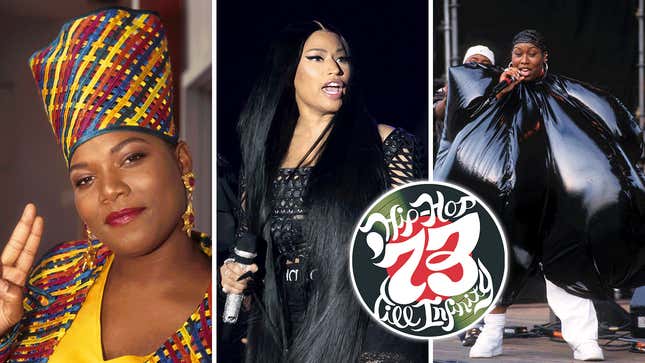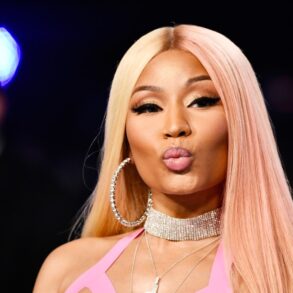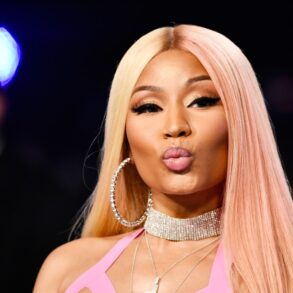
This story is part of our new Hip-Hop: ’73 Till Infinity series, a celebration of the genre’s 50th anniversary.
To commemorate the 50th anniversary of hip-hop, we’re looking back at 25 songs by women that helped define the genre, from the funk-based offerings of the Sequence (signees to the pioneering Sugar Hill Records label) to the subversive raunchiness of Megan Thee Stallion. It’s no secret that women remain underrated and -represented in rap, though this fact may astound in the face of their consistently brilliant contributions to the genre throughout the decades. Queen Latifah, Salt-N-Pepa, Nicki Minaj, Lauryn Hill, Lil’ Kim, and so many others on this list have left their mark on a genre to such an extent that hip-hop simply would not be the same without them. We salute them.
The one that started it all. “Funk You Up” was one of the first releases on the legendary Sugar Hill Records, and the first released single by a group of women rappers. The Sequence famously featured Angie Stone, who would go on to great success in the ‘90s by singing throwback soul.
Killer couplet: “See, I’m cold as ice, I’m twice as nice/I get more sex than a cat chase mice”
If going viral was a thing in 1984, “Roxanne’s Revenge” would have fit the description to a T. It was an utter phenomenon devised by producer Marley Marl, who tapped a then 14-year-old known around the Queensbridge projects for her battle-rap skills to record a response to U.T.F.O.’s hit “Roxanne, Roxanne.” They straight up picked a fight, in the process launching Roxanne Shanté’s career and setting a precedent for dis raps. In 2016, she told Jezebel that she recorded her rap while doing her laundry.
Killer couplet: “Tryin’ to be like me, yeah, it is very hard/You think you are God, but you do eat lard”
Initially, “Push It” was released as the b-side to Salt-N-Pepa’s single “Tramp,” but it simply would not be confined to such a lesser status. The propulsive song, which hardly sounded like any hip-hop of its day (or since), ended up going Top 20 on the Billboard Hot 100 and was the first crossover hit by women rappers. (Blondie’s “Rapture” is often cited as the first No. 1 song with rapping, though what Debbie Harry does in that song, while endearing, is more “rapping” than rapping.) This kicked off the career of one of golden-age hip-hop’s most memorable duos, irrespective of gender.
Killer couplet: “Yo, yo, yo, yo, baby-pop, yeah, you! Come here, gimme a kiss/Better make it fast or else I’m gonna get pissed”
A chrome-plated slice of West Coast electro that made its way East and all around, “Supersonic” was one of the earliest hits to be produced by Dr. Dre (alongside the Arabian Prince). The trio’s acrostic breakdown of their song’s title (“The S is for super, the U is for unique…”) has been interpolated repeatedly (Fergie did it on her No. 2 single “Fergilicious”), but no one has done it better than J. J. Fad.
Killer couplet: “You see my beat box is fresh, it’ll blow your mind/And if you don’t like my beats, I’ll go big in your behind”
The first solo No. 1 on Billboard’s then-new Hot Rap Singles chart, “Cha Cha Cha” was a wake-up call to all who weren’t already taking MC Lyte seriously. In her time, the “dopest female that you’ve heard thus far” commanded as much respect as the most beloved male rappers like Big Daddy Kane and KRS One.
Killer couplet: “I might just get quicker than the ticker of your pacemaker/More tender than a roni but harder than a jawbreaker”
A major team-up when their careers were just getting started, Queen Latifah and Monie Love’s affirming collaboration “Ladies First” was an antidote to a lot of the sniping that had defined the careers of women rappers up to this point, thanks in part to the “Roxanne” craze (“Roxanne’s Revenge” spawned a boutique industry of answer records). And the hook, delivered by Latifah herself, was a rare expression of versatility and a preview for the hybrid singer-rapper type that would flourish in the ‘90s (via artists like Lauryn Hill and Missy Elliott). You could probably even trace Drake back to this if you wanted.
Killer couplet: “A woman can bear you, break you, take you/Now it’s time to rhyme can you relate to (A sister dope enough to make you holler and scream)”
BWP’s name (short for Bytches With Problems) was clearly inspired by NWA and they could be just as profane. And like those guys, they could get just as political, taking on police violence and, in this particular case, consent. It remains a rare topic in popular music.
Killer couplet: “No means no, my brother/Are you deaf in your ear, motherfucker?”
Ice Cube’s protege Yo-Yo made her debut on his “It’s A Man’s World,” off his first album, AmeriKKKa’s Most Wanted. She followed it up with her own album, 1991’s Make Way for the Motherlode, a collection of funky West Coast tracks that showcased Yo-Yo’s womanist sensibility and a voice that was as golden as her braids.
Killer couplet: “I’m a lady, who will pull a stunt though/I K-O suckas, and even hit the blunt, so”
Without using the word “patriarchy,” Los Angels’ Nikki D disavowed it by smashing the image she failed to live up to in “Daddy’s Little Girl,” in which her character parties and gets unexpectedly pregnant. Nikki was the first woman rapper signed to the iconic Def Jam label. “Daddy’s Little Girl” was her biggest song, sampling the preceding year’s hit “Tom’s Diner,” and turning it into Nikki’s playground.
Killer couplet: “Sort of raunchy I must be, ‘cause Mama knew/Every time I skipped school Mama sat home and sang the blues”
Another Def Jam signee, Lichelle Marie Laws openly toyed with her own image on her grimy, ironically titled album Born Gangstaz, on whose cover she appeared holding a gun. The album’s intro is a voicemail from her actual mother, who describes her daughter as “a young lady who was brought up through Catholic school for 12 years; and dance schools, tap dance, jazz, piano lessons and all of that,” in reference to the middle-class upbringing that Laws would abandon when she moved to the south side of Los Angeles and became Bo$$. She was unafraid to engage with the discordant origins that other rappers try to obfuscate, and her furious flow and seriously funky beats (this song is insane!) were plenty convincing anyway.
Killer couplet: “I talk a lot of shit but I can back it all the fuck up/I’m real cool people until some bullshit get brung up”
Foxy Brown’s second single crossed over to the pop charts in a big way, announcing a major talent to the the world who would help define female-led rap for the latter half of the ‘90s.
Killer couplet: “Na Na, y’all can’t touch her/My sex drive all night like a trucker”
A song and video that changed everything, including what hip hop could be. Elliott was already ascending, thanks to her songwriting (for the likes of Aaliyah) and guest spots (perhaps most notably on the remix of Gina Thompson’s 1996 single “The Things You Do,” featuring Elliott’s famous “hee-hee-how” rap). Everything about “The Rain”—the styling, the flow, the wonky pace—felt like a revolution when it was released in 1997. It still does.
Killer couplet: “Sway or do-si-do like you loco/Can we get kinky tonight? Like Coko”
It wasn’t the first “crew” song collecting a disparate group of women rappers (Brandy did it by gathering Queen Latifah, MC Lyte, and Yo-Yo for the “I Wanna Be Down” remix, and the hip-hop version of “Freedom,” from the Panther soundtrack, was a who’s who of women in rap in 1995), but “Not Tonight” was one of the most popular examples of the form as it features titans like Lil’ Kim, TLC’s Left Eye, and Da Brat. Boosting the sisterhood quotient considerably, the video features cameos from artists who don’t appear on the actual song, like Mary J. Blige, Queen Latifah, and Xscape.
Killer couplet: “I stay focused in the dopest/Like a penny with a hole in it, y’all just hopeless”
Lauryn Hill is the kind of rare multi-threat whose rapping is on par with her tremendous singing. The Miseducation of Lauryn Hill’s “Doo Wop (That Thing)” became the first song by a woman rapper to hit No. 1 on the Billboard Hot 100. “Lost Ones,” also on that album, showed that Hill could carry a song by focusing on rapping—this is a scathing diss track that many assumed targeted her Fugees bandmate Wyclef Jean.
Killer couplet: “Trying to pretend like your word is your bond/But until you do right, all you do will go wrong”
A hit from the debut solo album of Three 6 Mafia’s Gangsta Boo, “Where Dem Dollas At” helped show to the rest of the country that Memphis was a force to be reckoned with. It came at a time when East/West rivalries had already proven fatal, and hip hop was showing that it would not be confined just to coasts.
Killer couplet: “Hard times got me whinin, conversation and kickin’ it/Hooked up with a little Cryst’ now I’m back on my pimpin’”
Another major milestone for the South, Trina’s debut solo single told us of her supremacy. And then she spent her career proving it.
Killer couplet: “If you’re curious just ask me hoes/And yes dick sucking comes quite natural”
Eve broke out of her crew Ruff Ryders with a debut album featuring the infectious, bubblegummy “Gotta Man.” But on another track, “Love Is Blind,” things turned serious as she rapped from the perspective of a concerned friend of an abused woman. It was based on a true story, too. Yet another example of a woman drawing from her life to bring an under-discussed topic to hip-hop.
Killer couplet: “I don’t even know you and I’d kill you myself/You played with her like a doll and put her back on the shelf”
Khia’s paen to oral sex (all of it) can still annihilate a dance floor, now over 20 years after its release. An absolutely indomitable message: “Lick my pussy and my crack.”
Killer couplet: “Slow head, show me so much love/The best head comes from a thug”
One of the funniest and most dextrous rappers to ever do it, Jean Grae took on the topic of abortion on her third studio album, 2008’s Jeanius. Sensitive and complex, the track shares its narrator’s conflicting feelings about undergoing the procedure, as well as vivid imagery describing it.
Killer couplet: “And you don’t know what it’s like in waiting rooms/And outside their picketing pictures could slay you”
OK, so this technically was released by Kanye West, but everyone whose heard it knows it’s Nicki’s song. When she recorded her verse, she was still a mixtape artist known best for guest spots on others’ tracks. On “Monster” she proved she was a star in her own right by stealing the show from the greats with whom she spit alongside. This was a milestone for Minaj, who would prove to be one of the most famous and beloved rappers of her time, and for a long stretch was basically the only woman rapper with any commercial impact.
Killer couplet: “So let me get this straight, wait, I’m the rookie?/But my features and my shows ten times your pay?”
A track so undeniable that it bought its shit-talking (and frequently bigoted) creator an entire career’s worth of good will. No matter what Azaelia Banks says or does, she will always have made “212″ and that’s more than just about anyone else on earth can say.
Killer couplet: “I can freak a fit that pump with the peep and/You know what your bitch become when her weave in”
For a period, you couldn’t go anywhere in New York without hearing “Try Me,” a disquietingly calm provocation by Detroit’s Dej Loaf. The kind of sing-sung flow in this song would only gain in popularity in the years after this hit, but little else sounded like “Try Me” before or since. A perfect song.
Killer couplet: “Mind full of money, got a heart full of demons/Mobbin’ like Italians, we really take yo fingas”
Another ubiquitous track in its day, “OOOUUU” was the rare rape hit by a woman not named Nicki Minaj during this time. From jump, Young M.A was open about being attracted to women (though she’d later clarify and disavow the “lesbian” label). As a rare out rapper, she was matter of fact about it, as she was about most things per her laid-back vibe.
Killer couplet: “Every time I’m out, why she stressin’ me?/You call her Stephanie? I call her Headphanie”
A huge breakthrough not just for Cardi B, who’d been known as a personality via her hilarious work on VH1’s Love & Hip Hop, but for rap in general, as the runaway success of “Bodak Yellow” reminded shortsighted listeners that there was room for more than one woman on top. When it hit No. 1 on the Billboard Hot 100, “Bodak Yellow” was the first solo song led by a female rapper to do so since Lauryn Hill’s “Do Wop (That Thing)” in 1999. It launched a major career. Imagine music without Cardi! Impossible.
Killer couplet: “And I just checked my accounts, turns out, I’m rich, I’m rich, I’m rich/I put my hand above my hip, I bet you dip, he dip, she dip”
Any number of Megan Thee Stallion songs could have made this list (“Hot Girl Summer,” “Savage” with Beyoncé, and “WAP” with Cardi B all spring to mind), but we chose “Thot Shit” to represent her contribution to the form for its unequivocal assertion regarding pleasure and setting her image on her terms. In the song’s brilliant Megan and her dancers torment a white patriarchal senator who demeans them, filling his life wherever he turns with their domineering sexuality.
Killer couplet: “Hoes said they wish a bitch would, and I’m a genie/Bitch so hot, gotta stay in bikinis”
This post was originally published on this site be sure to check out more of their content.





